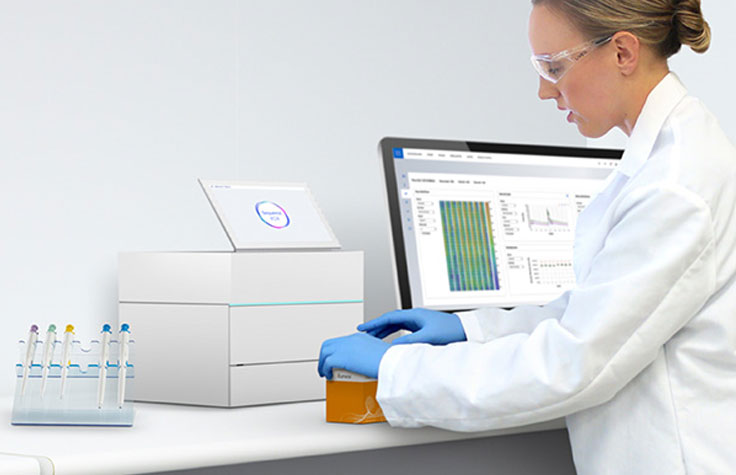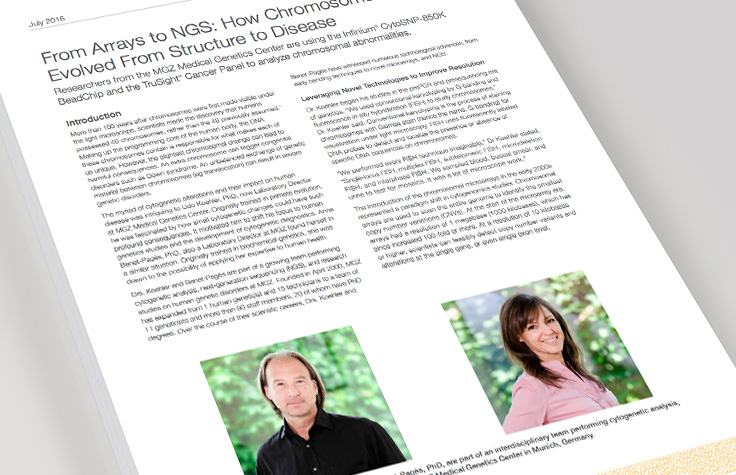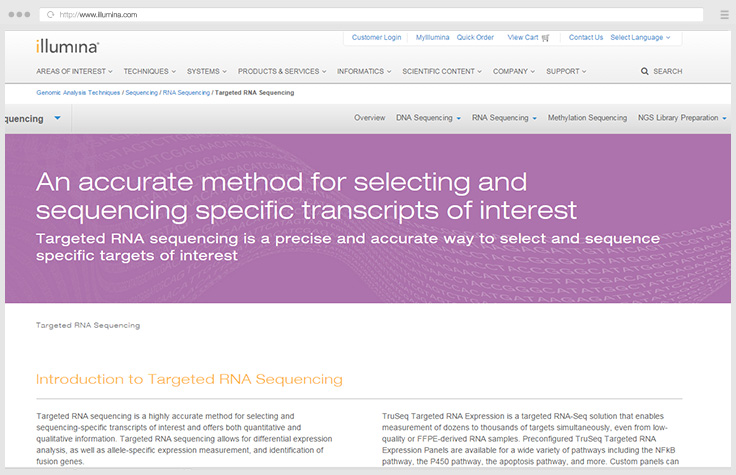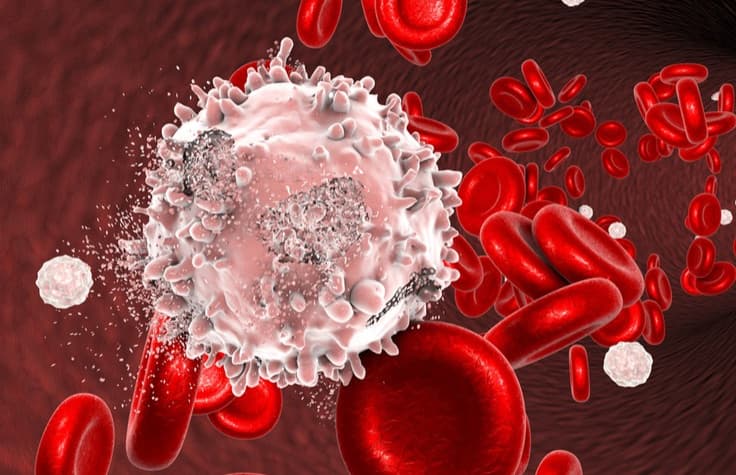ターゲット遺伝子シーケンスパネル
ターゲット遺伝子シーケンスの紹介
ターゲット遺伝子シーケンスパネルは、与えられたサンプル中の特定の変異を解析する上で有用なツールです。焦点を絞ったパネルには、研究対象の疾患または表現型との関連性があることが判明しているか関連性がある疑いのある一連の遺伝子または遺伝子領域が含まれます。遺伝子パネルは、あらかじめ選択されたコンテンツを購入することもできますし、興味のあるゲノム領域を含むようにカスタム設計することも可能です。
次世代シーケンサー(NGS)は、目的とするターゲット遺伝子を評価するためのスケーラビリティ、速度、解像度を提供します。多数のサンプルにわたって複数の遺伝子を並行して評価できるため、複数の異なるアッセイの実行に伴う時間を節約し、コストを削減できます。ターゲット遺伝子シーケンスでは、全ゲノムシーケンスのようなより幅広いアプローチと比べて、より小さく管理しやすいデータセットが生成されるため、解析がより容易になります。
柔軟でアクセシブルなシーケンス装置
ベンチトップシーケンスシステムにより、初心者は幅広いアプリケーションにわたってターゲットシーケンスを実行できます。
カスタムのターゲット遺伝子シーケンス手法
研究者は、カスタムデザインを使用して、特定の研究的興味に関連するゲノム領域をターゲットにできます。カスタムターゲットシーケンスは、特定のパスウェイ内の遺伝子の調査や、全ゲノム関連解析(GWAS)または全ゲノムシーケンスからのフォローアップ実験に理想的です。
イルミナは、カスタムターゲット遺伝子シーケンシングのために、ターゲットエンリッチメントとアンプリコンシーケンシングの2つの手法をサポートしています。
- ターゲットエンリッチメント:目的の領域は、ビオチン化プローブとのハイブリダイゼーションによって捕捉されてから、磁気プルダウンによって分離されます。ターゲットエンリッチメントは、実験デザインに応じて20 kb~62 Mbの領域を捕捉します。
- アンプリコンシーケンス:目的の領域は、高度にマルチプレックス化されたオリゴプールを使用して精製されます。研究者は、この手法を使用して、使用しているライブラリー調製キットに応じて、1回のランでごく少数の遺伝子から数百もの遺伝子をシーケンスできます。
注目のソリューション:
Illumina DNA Prep with Enrichment:ゲノムDNA、組織、血液、唾液、FFPEサンプルのための迅速で柔軟なターゲットシーケンスライブラリー調製ソリューション。
Illumina Cell-Free DNA Prep with Enrichment:cfDNAサンプルからの高感度変異検出に対応した、高速かつスケーラブルなライブラリー調製。
Illumina Custom Enrichment Panel v2:完全にカスタマイズされたエンリッチメントソリューションを可能にするカスタムターゲットエンリッチメントシーケンスパネル。
DesignStudioソフトウェア:プローブデザインを最適化するために動的フィードバックを提供する使いやすいオンラインソフトウェアツールです。
AmpliSeq for Illuminaカスタムパネル:目的のコンテンツに最適化されたカスタム化したターゲットシーケンスパネルを作成します。
アンプリコンシーケンスとターゲットエンリッチメントの利点比較
ターゲットエンリッチメント |
アンプリコンシーケンス |
| 対象となる遺伝子が多い、通常は50遺伝子以上 | 対象となる遺伝子が少ない、通常は50遺伝子以下 |
| すべてのバリアントタイプを対象とした、より包括的なプロファイリング | 1塩基変異(SNV)と挿入と欠失(Indel)の解析に理想的 |
| より包括的な手法だが、ハンズオンタイムとターンアラウンドタイム*が長い | より経済的で、ワークフローがより簡単 |
*ターンアラウンドタイムは、ライブラリー調製アッセイタイム(DNAからライブラリー完成まで)です。
ターゲット遺伝子シーケンスの利点
- 目的の遺伝子を高深度(500~1000×以上)でシーケンスできるため、希少なバリアントを特定できる
- 疾患関連遺伝子の研究のために費用対効果の高い発見を実現する
- 低いアレル頻度(最低0.2%)でバリアントを同定し、解釈しやすい精確な結果を提供する
- 1つのアッセイで原因となる新規または遺伝性変異を信頼度の高い方法で同定できる
事前設計されたターゲット遺伝子パネル
事前設計されたターゲット遺伝子シーケンスパネルには、論文や専門家の知見に基づいて選定された、疾患や表現型に関連する重要な遺伝子、または遺伝子領域が含まれています。関与する可能性が高い遺伝子に解析対象を絞ることで、リソースの効率的な活用が可能となり、データ解析の負担も最小限に抑えられます。これらの事前設計NGSパネルは、がん、遺伝性疾患、心疾患、自閉症など、さまざまな疾患研究に利用できます。

注目のソリューション
DesignStudioソフトウェア
プローブデザインを最適化するために動的フィードバックを提供する使いやすいオンラインソフトウェアツールです。
Illumina Custom Enrichment Panel v2
複数のターゲットシーケンスアプリケーションに対応する、シンプルかつ効率的なターゲットカスタムエンリッチメントパネル。
Illumina DNA Prep with Enrichment
DNA用の高速で柔軟なターゲットシーケンスライブラリー調製ソリューション。
ターゲットマルチジーンパネルで効率的なバリアントの発見を実現
NGSを使用してサンガー法からターゲットシーケンス法に切り替えたことで、ミラノの研究者は、神経疾患や代謝性疾患に関連するバリアントのデータを明らかにしました。
インタビューはこちら
関連ソリューション
がん遺伝子シーケンス

ターゲットがん遺伝子パネルは、がんとの関連性があることが判明している一連の遺伝子または遺伝子領域に焦点を当てています。ターゲットリシーケンス研究によって提供される深いカバレッジにより、高感度な希少バリアントコールが可能になります。ターゲットがん遺伝子パネルの詳細はこちら
希少疾患バリアント解析

NGSは、サイエンティストが、希少疾患や未診断疾患に関連するバリアントを明らかにしたり、疾患のメカニズムを調査したりするのに役に立ちます。希少疾患ゲノミクスの詳細はこちら。
感染症アプリケーション

仮説の不要なメソッドとして、NGSは、わずか1つのSNPだけ異なる感染症株を区別し、複数の検査を置き換えることができます。感染性疾患におけるNGSの詳細はこちら。
着床前遺伝子検査(PGS)

このアプローチは、23対の染色体すべてをスクリーニングすることによって胚の染色体状態を判断するもので、体外受精の研究に貴重な洞察をもたらします。PGSの詳細はこちら。
ゲノム解析技術に関する最新のニュース、事例研究、情報をお届けします。Eメールアドレスをご入力の上、ご登録ください。
補足資料

研究ニーズに合わせたカスタムパネルコンテンツ
Illumina Custom Enrichment Panel v2では、完全なカスタムパネルまたはスパイクインパネルを作成できます。迅速なデリバリー、高いオンターゲットエンリッチメント、そして効率的で信頼性の高い結果を得るための合理化されたワークフローをお楽しみください。
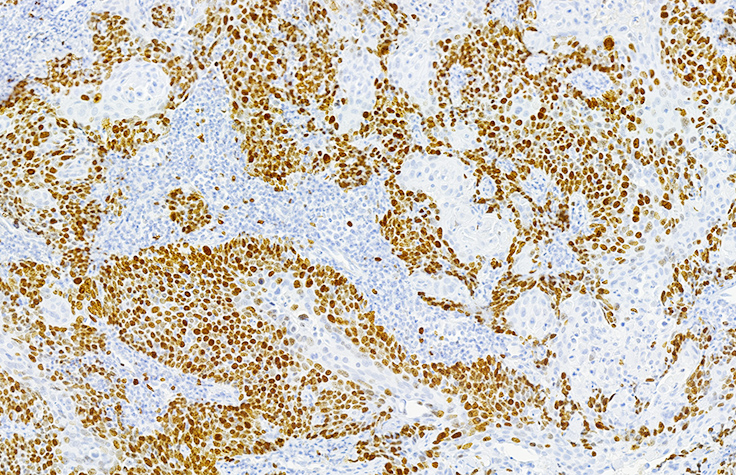
腫瘍解析用のターゲット遺伝子パネル
Dr. Ravindra Kolheのラボでターゲットを絞ったNGSパネルを使用することで、単一のアッセイで腫瘍に関連する多数のバリアントをどのように研究できたかについてDr. Ravindra Kolheが話します。

自閉症研究用のシーケンスパネルの開発
Dr. Jonathan Pevsnerのラボが、自閉症研究用の遺伝子パネルの開発にどのように貢献できたかについてDr. Jonathan Pevsnerが話しをします。

Targeted NGS Empowers Genetic Insights
Dr. Samuel Myllykangasが、現在および今後のNGSイノベーションが遺伝子検査の未来にどのように影響するかについて述べています。

ラボ内NGSで研究を拡張する
Regina Maria Genetic Center LaboratoryのコーディネーターであるDr. Irina Iordanescuが、小児の遺伝性疾患検査や腫瘍学における全エクソームシーケンスやターゲットシーケンスパネルなどのアッセイをNGSがどのように強化したかについて説明します。同医師がNGSを使用して、どのようにしてコストを削減しながら、サンプル処理の高速化と拡張を実現したかをご覧ください。
